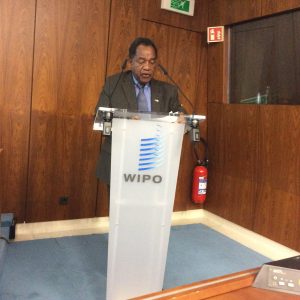On the 17th of November the International Authors Forum held a side event at the World Intellectual Property Organisation SCCR 33 to launch the new Guide to Public Lending Right, created by the International PLR Network in partnership with the IAF.
His Excellency, Mr. Robert Salama, Permanent Representative of Malawi to the United Nations, Geneva, kindly opened the session introducing Public Lending Right (PLR) to the delegates at the 33rd SCCR at WIPO. In his opening speech his Excellency spoke about the importance of PLR in providing a varied source of income to support authors and the importance of such a measure in Africa.
Authors are the first link in the economic value chain for the creation of a book. They contribute to a culturally relevant education for our children, which in turn assures economic growth in a country like Malawi…across Africa…and all around the world. I call on this meeting to value authors and what they have to contribute to culture, education and economic growth.

The panel included:
- Dora Susan Makwinja (Chair), Executive Director of the Copyright Society of Malawi (COSOMA)
- Jim Parker, Coordinator of the International PLR Network
- Arjen Polman, Manager of Stichting Leenrecht (Netherlands)
- Erna Winters, Director of public library Kennemerwaard and former board member of EBLIDA
- Maggie Gee, author, Vice-president of the Royal Society of Literature and former member of the UK PLR Committee
The panel was opened by Dora who discussed the establishment of PLR in Malawi with a legal basis and arrangements for government funding. She spoke about the value of the government funding it as a way to contribute to the arts in Malawi. Jim Parker talked through his experience of working on PLR for 30 years in the United Kingdom, and how he has since utilized this experience by developing the International PLR Network, sharing best practice between other countries running and developing PLR systems. From this perspective he gave an overview of common points of similarity and differences between the different PLR systems in a number of countries. Jim then explained how and why the PLR Introductory Guide had been developed to set out the possibilities for process, the value of PLR to authors and guidance for establishing PLR systems.
Arjen gave an overview of how the PLR system in the Netherlands, implemented by Stichting Leenrecht, operates and how it has been developed to take into account not just writers but publishers and illustrators as well. He noted that it also extends to other media loaned by libraries such as film and music. Arjen discussed how the system has been particularly successful in the Netherlands by making it more feasible for authors to write on the basis that they will be compensated for loans, broadening the output of Dutch books. Giving the perspective of Dutch Libraries, Erna discussed the challenges that arose from PLR being part of the library’s budgets in the Netherlands and how Government funding of it helps support the educational and cultural goals of libraries. Erna also spoke about how PLR can balance the interests of a wide variety of authors through payments and diverse book catalogues.
Giving the perspective of an author, Maggie Gee talked through her personal experience with libraries and PLR, how it had sustained her early career, given a second life to many of her works and connected her and her books with readers who might not be able to buy them.

The questions that followed covered several topics, but were mainly from the significant number of librarian organisations in attendance whose main concerns focused on the funding of PLR, potentially from their own budgets, their position in supporting authors and the symbiosis of authors and libraries. His Excellency Mr. Robert Salama spoke about his hopes for PLR in Malawi, how it is a good means to support authors in his country and the opportunity this creates for Malawian cultural exports, especially in Chewa, a language shared with other African nations. His Excellency also spoke about how PLR connects with a government responsibility to invest in writers and readers for the sake of culture and the means to self-improvement they provide.

